新概念英语第二册第一课 PPT
合集下载
新概念英语第二册 第一课(共22张PPT)

11. none [nʌn] pron. 没有人;没有任何东西,一个也没有,毫 无; adv. 决不 I searched bookstores and libraries for information, but found none. 我查找了多家书店和图书馆,但没查到任何信息。
12. It’s none of your business. 关你屁事;这不关你的事。
class.上课期间你要专心听老师讲课。 15. ___I_n__th__e__e_n_d____they reached a place of safety.
他们终于到达了一个安全的地方。
16. Peter and Tom made up __in___th__e__e_n_d____.
彼特和汤姆最后和解了。 17. The shelf, too weak to ___b__e_a_r___all the books,
14. private ['praɪvət] adj. 私人的;个人的;私下的;私有的
The president is paying a private visit to Europe. 总统正在欧洲进行私人访问。 We each have our private views about it. 我们每个人对这件事都有自己的看法。
关你屁事;这不关你的事。 13. __r_u_d__e_l_y_ adv. 无礼地;粗暴地 14. __p__ri_v_a_t_e__ly___ adj. 私人的;个人的;
私下的;私有的 15. __c_o__n_v_e_r_s_a__ti_o_n_ n. 谈话;会话
Step 2 在语境中加深对词汇短语的理解与记忆,掌握其具体用法。 1. theatre [ˈθiːətər] n. 电影院,戏院;戏剧
12. It’s none of your business. 关你屁事;这不关你的事。
class.上课期间你要专心听老师讲课。 15. ___I_n__th__e__e_n_d____they reached a place of safety.
他们终于到达了一个安全的地方。
16. Peter and Tom made up __in___th__e__e_n_d____.
彼特和汤姆最后和解了。 17. The shelf, too weak to ___b__e_a_r___all the books,
14. private ['praɪvət] adj. 私人的;个人的;私下的;私有的
The president is paying a private visit to Europe. 总统正在欧洲进行私人访问。 We each have our private views about it. 我们每个人对这件事都有自己的看法。
关你屁事;这不关你的事。 13. __r_u_d__e_l_y_ adv. 无礼地;粗暴地 14. __p__ri_v_a_t_e__ly___ adj. 私人的;个人的;
私下的;私有的 15. __c_o__n_v_e_r_s_a__ti_o_n_ n. 谈话;会话
Step 2 在语境中加深对词汇短语的理解与记忆,掌握其具体用法。 1. theatre [ˈθiːətər] n. 电影院,戏院;戏剧
新概念2册第一课讲解ppt课件

定句中) • Can‘t bear =can’t stand 不能忍受 • e.g. I can't stand your bad habit. • e.g. I can't stand the noise. • e.g. She eats too fast. I can’t bear to watch/watching
经营者提供商品或者服务有欺诈行为 的,应 当按照 消费者 的要求 增加赔 偿其受 到的损 失,增 加赔偿 的金额 为消费 者购买 商品的 价款或 接受服 务的费 用
Questions
• Where did the writer go last week? • Why didn’t he enjoy the play? • What did the young man say to the writer?
e.g. The play was very interesting
e.g. Last week I went to the theatre
• 人称代词/名词 + was/were + doing+其他 e.g. A young man and a young woman were
sitting behind me e.g. They were talking loudly.
经营者提供商品或者服务有欺诈行为 的,应 当按照 消费者 的要求 增加赔 偿其受 到的损 失,增 加赔偿 的金额 为消费 者购买 商品的 价款或 接受服 务的费 用
经营者提供商品或者服务有欺诈行为 的,应 当按照 消费者 的要求 增加赔 偿其受 到的损 失,增 加赔偿 的金额 为消费 者购买 商品的 价款或 接受服 务的费 用
能跟人)
经营者提供商品或者服务有欺诈行为 的,应 当按照 消费者 的要求 增加赔 偿其受 到的损 失,增 加赔偿 的金额 为消费 者购买 商品的 价款或 接受服 务的费 用
Questions
• Where did the writer go last week? • Why didn’t he enjoy the play? • What did the young man say to the writer?
e.g. The play was very interesting
e.g. Last week I went to the theatre
• 人称代词/名词 + was/were + doing+其他 e.g. A young man and a young woman were
sitting behind me e.g. They were talking loudly.
经营者提供商品或者服务有欺诈行为 的,应 当按照 消费者 的要求 增加赔 偿其受 到的损 失,增 加赔偿 的金额 为消费 者购买 商品的 价款或 接受服 务的费 用
经营者提供商品或者服务有欺诈行为 的,应 当按照 消费者 的要求 增加赔 偿其受 到的损 失,增 加赔偿 的金额 为消费 者购买 商品的 价款或 接受服 务的费 用
能跟人)
新概念英语第二册Lesson1课件
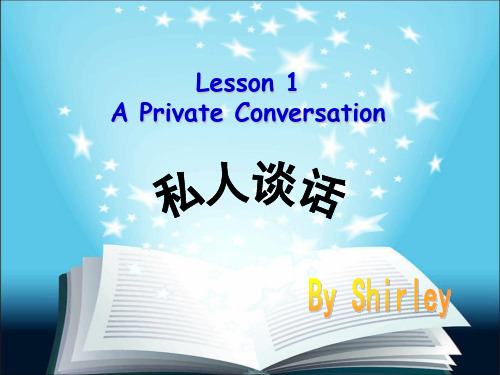
I could not hear the actors.
Key structures and usage
过去进行时:过去某个时间正在进行 或发生的动作 A young and a young woman were sitting behind me.
They were talking loudly.
• • • • • • • • • • • • • • •
【Key structures】 简单陈述句的语序 陈述句一定是有主语,有动词,有宾语,有句号 6 1 2 3 4 5 6 when? Who? Action Who? How? Where? When? Which? Which? What? What? 1 ---主语,一般由名词、代词或名词短语构成,通常位于动词之前,动词必 须与主语一致,即主语决定动词的单复数形式 2 ---谓语,由动词充当 3 ---宾语,一般为名词、代词或名词短语 4 ---副词或介词短语,对方式或状态提问,往往做状语 I like her very much 5 ---地点状语,一般在方式副词之后,时间副词之前 6 ---时间状语,可以放在句首或句末 简单陈述句一定不能少的是主语, 谓语. 如果问何时何地,是一个固定搭配 when and where
• • • • • •
★business n. 事, 生意 ① n. 生意 business man :生意人 do business: 做生意 ② n. 某人自己的私人的事情 It's my business. (指私人的事, 自己处理的 事) • It's none of your business. 不关你的事。
Language points
以下短语中名词前不加冠词:
新概念-2-Lesson-1-By-TurnerPPT课件

• have-had-had-having 有 • Seat 座位 a good seat =sit in a good
place
8
The play was very interesting.
• is-was • interesting adj. 有趣味的
9
事情有趣味 be interesting 人对…感兴趣 be interested in
• Last adj. 上一个
• Last Monday 上周一
• Last year 去年
• Last month 上个月
• 原形-过去式-过去分词-ing
•1
-
2-
3
• go –went – gone – going 去
-4
6
go to the theatre 去剧院(看 戏)
7
I had a very good seat.
11
A young man and a young woman were sitting behind me. • Woman(单数) /’wumən/ • Women(复数)/’wimin/ • 注意发音区别 • 过去进行时 • 主语+ was/were + doing +其它 • young 年轻的 = not old
• pay the bill 买单
• any 一些 用于否定句和疑问句
• pay for
2
New words and expressions 默写下列词汇
• ______ [ 'praɪvit ] adj. 私人的 • ______ [ ‘kɒnvə'seɪʃn] n. 谈话 • ______ ['θɪətə] n. 剧场,戏院 • ______ [siːt] n. 座位 • ______ [plei] n. 戏 • ______ [‘laudli] adv. 大声地 • ______ ['æŋɡri] adj. 生气的 • ______['æŋɡrili] adv. 生气地 • ______[ə'tenʃn ] n. 注意 • ______ [beə] v. 容忍 • ______[‘bɪznis] n. 事 (注意音标 剑桥词典) • ______[‘ru:dli] adv. 无礼地,粗鲁地
place
8
The play was very interesting.
• is-was • interesting adj. 有趣味的
9
事情有趣味 be interesting 人对…感兴趣 be interested in
• Last adj. 上一个
• Last Monday 上周一
• Last year 去年
• Last month 上个月
• 原形-过去式-过去分词-ing
•1
-
2-
3
• go –went – gone – going 去
-4
6
go to the theatre 去剧院(看 戏)
7
I had a very good seat.
11
A young man and a young woman were sitting behind me. • Woman(单数) /’wumən/ • Women(复数)/’wimin/ • 注意发音区别 • 过去进行时 • 主语+ was/were + doing +其它 • young 年轻的 = not old
• pay the bill 买单
• any 一些 用于否定句和疑问句
• pay for
2
New words and expressions 默写下列词汇
• ______ [ 'praɪvit ] adj. 私人的 • ______ [ ‘kɒnvə'seɪʃn] n. 谈话 • ______ ['θɪətə] n. 剧场,戏院 • ______ [siːt] n. 座位 • ______ [plei] n. 戏 • ______ [‘laudli] adv. 大声地 • ______ ['æŋɡri] adj. 生气的 • ______['æŋɡrili] adv. 生气地 • ______[ə'tenʃn ] n. 注意 • ______ [beə] v. 容忍 • ______[‘bɪznis] n. 事 (注意音标 剑桥词典) • ______[‘ru:dli] adv. 无礼地,粗鲁地
新概念英语NCE2_Lesson01(共43页)课件

What’s the matter? business 私人事情
It‘s none of my business. affair 事务、事件(较正式)
international affairs, love affairs
[作n.] 生意、出差
do business with sb 和某人做生意
比较I was sitting in front of them.
[语言点2] young adj., man n. 形容词 修饰名词作定语。请注意它的位置,一 般放在被修饰的名词之前,但如果是介 词短语、形容词短语或修饰名词的从句 则放在被修饰名词之后。
比如: a man in the room(介词短语)
I do not know how she puts up with his cruelty to her. 我不明白她怎么能容忍他的虐待。 suffer 忍受伤害、精神、病痛、失败
She was suffering from a headache. 她正经受头痛之苦。
business
[作n.] 事情 thing 泛指事情 matter 一般指麻烦的事情
一个完整的简单陈述句应该包括以下几 个部分:
主语 + 谓语 + 宾语或补语 + 方式状语 + 地点状语 + 时间状语(可前置句首)
问:一个最简单的陈述句至少应包括哪 几个部分?
答:一个主语和一个谓语足矣。
I eat. 我吃。 He drinks. 我喝。 I eat and drink.我吃我喝。(并列句) 文中 Last week I went to the
电影院看电影
2. I had a very good seat.
It‘s none of my business. affair 事务、事件(较正式)
international affairs, love affairs
[作n.] 生意、出差
do business with sb 和某人做生意
比较I was sitting in front of them.
[语言点2] young adj., man n. 形容词 修饰名词作定语。请注意它的位置,一 般放在被修饰的名词之前,但如果是介 词短语、形容词短语或修饰名词的从句 则放在被修饰名词之后。
比如: a man in the room(介词短语)
I do not know how she puts up with his cruelty to her. 我不明白她怎么能容忍他的虐待。 suffer 忍受伤害、精神、病痛、失败
She was suffering from a headache. 她正经受头痛之苦。
business
[作n.] 事情 thing 泛指事情 matter 一般指麻烦的事情
一个完整的简单陈述句应该包括以下几 个部分:
主语 + 谓语 + 宾语或补语 + 方式状语 + 地点状语 + 时间状语(可前置句首)
问:一个最简单的陈述句至少应包括哪 几个部分?
答:一个主语和一个谓语足矣。
I eat. 我吃。 He drinks. 我喝。 I eat and drink.我吃我喝。(并列句) 文中 Last week I went to the
电影院看电影
2. I had a very good seat.
新概念英语第二册的第一课.ppt
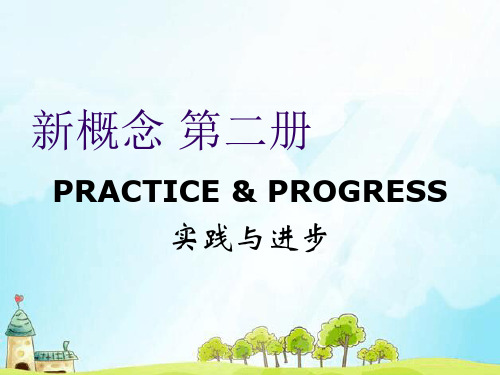
新概念 第二册
PRACTICE & PROGRESS
实践与进步
Lesson 1 内容△步骤
First:介绍自己
Second: 单词学习
Fifth: 作业
本课内容
Fourth:
时态练习
Third: 课文讲解
New words & Expressions
private adj. 私人的
angry adj. 生气的
conversation n. 谈话
angrily adv. 生气地
theatre n. 剧场,戏院 attention n. 注意
seat n. 坐位
bear v. 容忍
play n. 戏
business n. 事
loudly adv. 大声地
rudely adv. 无理地,粗鲁地
angrily. He was very ( ) A. sad b. unhappy c. cross d. pleased 9. The writer could not bear it. He could not
( )it. A. carry b. suffer c. stand d. lift 10. The young man spoke rudely. He wasn’t
副词变为形容词:loud 大声的
7. angry adj. 生气的 8. angrily adv. 生气地
angry形容词变副词:y变i加ly
9. attention n. 注意
Attention,please! 请注意! pay attention to sb./sth. 注意人/某事
pay no attention pay little attention pay close attention pay more attention
PRACTICE & PROGRESS
实践与进步
Lesson 1 内容△步骤
First:介绍自己
Second: 单词学习
Fifth: 作业
本课内容
Fourth:
时态练习
Third: 课文讲解
New words & Expressions
private adj. 私人的
angry adj. 生气的
conversation n. 谈话
angrily adv. 生气地
theatre n. 剧场,戏院 attention n. 注意
seat n. 坐位
bear v. 容忍
play n. 戏
business n. 事
loudly adv. 大声地
rudely adv. 无理地,粗鲁地
angrily. He was very ( ) A. sad b. unhappy c. cross d. pleased 9. The writer could not bear it. He could not
( )it. A. carry b. suffer c. stand d. lift 10. The young man spoke rudely. He wasn’t
副词变为形容词:loud 大声的
7. angry adj. 生气的 8. angrily adv. 生气地
angry形容词变副词:y变i加ly
9. attention n. 注意
Attention,please! 请注意! pay attention to sb./sth. 注意人/某事
pay no attention pay little attention pay close attention pay more attention
新概念二册教学课件Lesson 1.ppt

EXERCISES
NEW CONCEPT ENGLISH
THANK YOU
New words and expressions
❖ lawyer ❖n. 律师 ❖lawyer`s office ❖ bank ❖n. 银行,河岸 ❖Bank of China
New words and expressions
❖ salary ❖n. 工资 ❖collect the salary ❖pay the salary ❖ salary/wage/payment
TEXT
❖see sb. do sth. ❖hear sb. do sth. ❖notice sb. do sth. ❖let sb. do sth. ❖make sb. do sth. ❖have sb. do sth.
TEXT
❖ Comprehension ❖ B-B ❖ Structure ❖ B-A-B-C-C ❖ Vocabulary ❖ A-C-C-B-D
NEW CONCEPT ENGLISH
11
One good turn deserves another
❖New words and expressions ❖Text ❖Key structures and special difficulties ❖Exercises
New words and expressions
TEXT
❖pay sth. back = repay sth. ❖pay sb. back = revenge sb. ❖pay for sth. ❖pay sth. off
TEXT
❖ask sb. to do sth. ❖require sb. to do sth. ❖demand sb. to do sth. ❖allow sb. to do sth. ❖expect sb. to do sth. ❖advise sb. to do sth.
新概念英语第二册第一课 课件PPT

英语公开课
新概念英语第二册 第一课
A Private Conversation
主讲人:希城教育高级 英语教师 张文林
音
第
+标 自词 汇源自一 乐 章然拼
读
法
• 1 private
['praivit] a.私人的
• 2 conversation [kɔnvə'seiʃən] n.谈话
• 3 theatre
3. How did the young feel? A.happy B. sad C. angry D. worried
4. The writer looked at _________ angrily. A. her B. him C. them D. they
5. The young man and the young woman paid ________ attention to the writer. A. none B. any C. not any D. no
private conversation!'.
keys to the above exercise:
1.good 2.was 3.it 4.behind 5.got 6.actors 7.angrily 8.any 9.round 10.a
听课文选出最佳答案:
1. Where did the writer go last week?
4. Who got angry at last?
A. The writer B. The young man C. The woman
5. How many times did the writer turn round?
A. one
新概念英语第二册 第一课
A Private Conversation
主讲人:希城教育高级 英语教师 张文林
音
第
+标 自词 汇源自一 乐 章然拼
读
法
• 1 private
['praivit] a.私人的
• 2 conversation [kɔnvə'seiʃən] n.谈话
• 3 theatre
3. How did the young feel? A.happy B. sad C. angry D. worried
4. The writer looked at _________ angrily. A. her B. him C. them D. they
5. The young man and the young woman paid ________ attention to the writer. A. none B. any C. not any D. no
private conversation!'.
keys to the above exercise:
1.good 2.was 3.it 4.behind 5.got 6.actors 7.angrily 8.any 9.round 10.a
听课文选出最佳答案:
1. Where did the writer go last week?
4. Who got angry at last?
A. The writer B. The young man C. The woman
5. How many times did the writer turn round?
A. one
新概念英语第二册第一课PPT课件

关练习题。
听力和口语训练
通过听一段对话或短文,回答 问题或模仿发音,提高学生的
听力和口语能力。
阅读和写作
阅读一篇短文并完成相关习题 ,然后根据所学单词和语法结
构写一篇小作文。
Overview of New
02 Concept English Volume 2, Lesson 1
Text content
Reading comprehension questions
阅读理解题1
Answer the following questions based on the given passage.
阅读理解题2
Summarize the main points of the given passage in your own words.
01 Course Introduction
Course objectives
语言知识目标
技能培养目标
学生将掌握约30个新单 词,学习基本语法结构, 如现在进行时和一般现
在时。
通过听、说、读、写四 个方面的练习,提高学 生的英语听说读写能力。
情感态度目标
培养学生对英语学习的 兴趣和积极性,鼓励他 们大胆开口说英语,不
Difficult points
Some students may find it challenging to distinguish between possessive adjectives and possessive nouns, as well as to use prepositions of place correctly in context. Instructors should provide additional examples and exercises to help students overcome these difficulties.
听力和口语训练
通过听一段对话或短文,回答 问题或模仿发音,提高学生的
听力和口语能力。
阅读和写作
阅读一篇短文并完成相关习题 ,然后根据所学单词和语法结
构写一篇小作文。
Overview of New
02 Concept English Volume 2, Lesson 1
Text content
Reading comprehension questions
阅读理解题1
Answer the following questions based on the given passage.
阅读理解题2
Summarize the main points of the given passage in your own words.
01 Course Introduction
Course objectives
语言知识目标
技能培养目标
学生将掌握约30个新单 词,学习基本语法结构, 如现在进行时和一般现
在时。
通过听、说、读、写四 个方面的练习,提高学 生的英语听说读写能力。
情感态度目标
培养学生对英语学习的 兴趣和积极性,鼓励他 们大胆开口说英语,不
Difficult points
Some students may find it challenging to distinguish between possessive adjectives and possessive nouns, as well as to use prepositions of place correctly in context. Instructors should provide additional examples and exercises to help students overcome these difficulties.
新概念二第一课(共23张PPT)
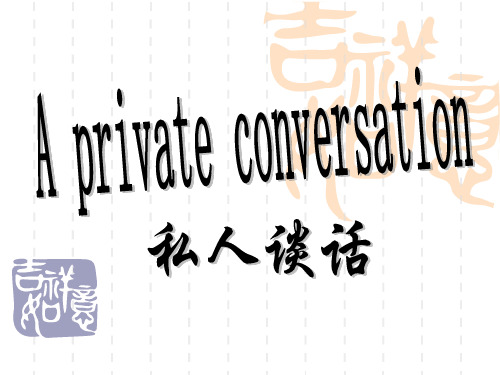
主语+谓语动词+宾语+方式状语+ 地点状语+时间状语
PS:时间状语可以置于开头 例:I read books carefully in
the library yesterday morning. = Yesterday morning, I read
books carefully in the library.
8.My job is repairing cars.(动名词做 表语)
9.The question is what you want to do.(从句做表语,即:表语从句)
二、主语———谓语 在这一句型中,动词为 不及物动词及不及物的动词词组。在有的 句子中,不及物动词可以有状语修饰。
1.The sun is rising. 2.I'll try. 3.Did you sleep well?(well做状语,修饰不
句型分析:
7.They did not pay any attention. 析: pay attention to sth/sb pay no attention to ..没有注意 8.It’s none of your business. 析:固定语法---不关你事!
本课语法—简单陈述句的语序
5.What do you want me to do?(不定式做宾补)
6.We thought him to be an honest man.(to be 做宾补)
7.He believed them to have discussed the problem.(不定式的完成式做宾补)
8.He believed her to be telling the truth.(不定 式的进行式做宾补)
PS:时间状语可以置于开头 例:I read books carefully in
the library yesterday morning. = Yesterday morning, I read
books carefully in the library.
8.My job is repairing cars.(动名词做 表语)
9.The question is what you want to do.(从句做表语,即:表语从句)
二、主语———谓语 在这一句型中,动词为 不及物动词及不及物的动词词组。在有的 句子中,不及物动词可以有状语修饰。
1.The sun is rising. 2.I'll try. 3.Did you sleep well?(well做状语,修饰不
句型分析:
7.They did not pay any attention. 析: pay attention to sth/sb pay no attention to ..没有注意 8.It’s none of your business. 析:固定语法---不关你事!
本课语法—简单陈述句的语序
5.What do you want me to do?(不定式做宾补)
6.We thought him to be an honest man.(to be 做宾补)
7.He believed them to have discussed the problem.(不定式的完成式做宾补)
8.He believed her to be telling the truth.(不定 式的进行式做宾补)
新概念第二册Lesson1课件PPT
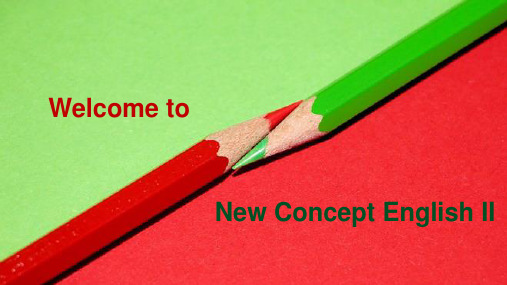
seatbelt = safety belt: 安全带 in the driver’s seat = in the leader’s seat/ place back-seat driver: 爱指手划脚的人 n. 席位
eg. win/lose a seat
2) vt. 安排….坐下; 使…就座
seat yourself. 你请坐。 Be seated, please. 请坐。 Sit down, please. Will you have a seat? Would you have a seat?
pay some attention to sth pay more attention to sth pay close attention to sth pay great attention to sth pay enough attention to sth pay little attention to sth pay no attention to sth.. 毫不在意
★ loud – adj. 大声的
1) adv. loudly adv. aloud
eg. She called loudly for help. = She called aloud for help.
think aloud 自言自语
★ attention – n. 注意
pay attention to sth
New words and expressions
★private - adj.
1) 私人的 (personal ) a private teacher a private car a private school private affairs eg. That is for your private ear. 这是说给你一个人的秘密。
eg. win/lose a seat
2) vt. 安排….坐下; 使…就座
seat yourself. 你请坐。 Be seated, please. 请坐。 Sit down, please. Will you have a seat? Would you have a seat?
pay some attention to sth pay more attention to sth pay close attention to sth pay great attention to sth pay enough attention to sth pay little attention to sth pay no attention to sth.. 毫不在意
★ loud – adj. 大声的
1) adv. loudly adv. aloud
eg. She called loudly for help. = She called aloud for help.
think aloud 自言自语
★ attention – n. 注意
pay attention to sth
New words and expressions
★private - adj.
1) 私人的 (personal ) a private teacher a private car a private school private affairs eg. That is for your private ear. 这是说给你一个人的秘密。
新概念第二册第一课课件

Where there is a will, there is a way.
言归正传Get down to business
Lesson 1
A private conversation
New words and expressions
• private /pr'aivit/
adj. 私人的
• conversation / kɔnvə'seiʃn / n. 谈话
表达坐的方式
Seat yourself please. Sit down, please. (命令性) Take your seat, please. Be seated, please. (更礼貌)
3. angry adj. 生气的=cross易怒的 angrily adv. 生气的
adj.+ly=adv. 1)一般词尾+ly loudly rudely 2) 词尾le变ly comfortable---comfortably gentle---gently possible---possibly
Attention n. 注意
• Attention, please. • pay a little/some/more/no
/close/great/enough attention • pay attention to sth • draw one’s attention • That’s all, thank for your attention
• theatre / 'θiətə(r) /
n. 剧院,戏院
• seat /s'iːt/
n. 座位
• play /pl'ei/
n. 戏
言归正传Get down to business
Lesson 1
A private conversation
New words and expressions
• private /pr'aivit/
adj. 私人的
• conversation / kɔnvə'seiʃn / n. 谈话
表达坐的方式
Seat yourself please. Sit down, please. (命令性) Take your seat, please. Be seated, please. (更礼貌)
3. angry adj. 生气的=cross易怒的 angrily adv. 生气的
adj.+ly=adv. 1)一般词尾+ly loudly rudely 2) 词尾le变ly comfortable---comfortably gentle---gently possible---possibly
Attention n. 注意
• Attention, please. • pay a little/some/more/no
/close/great/enough attention • pay attention to sth • draw one’s attention • That’s all, thank for your attention
• theatre / 'θiətə(r) /
n. 剧院,戏院
• seat /s'iːt/
n. 座位
• play /pl'ei/
n. 戏
新概念英语第二册第1课ppt课件
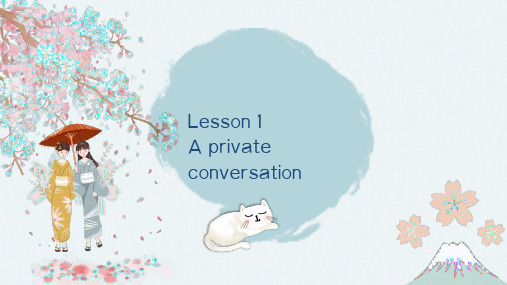
.
n. privacy 隐私.
It's my privacy. It's none of your business!
【反】 public adj. 公共的,公开的 .
New words
conversation n. 对话,谈话
.
have a conversation with sb 和某人有一个谈话 .
New words seat n. 座位 vt. 安排......坐下
. Have/take a/one's seat 请坐
..
请坐的2种说法 : Sit down,please.(命令性) Take your seat,please. (更礼貌)
New words angry adj. ___生__气__的_
Text
‘It's none of your business,' the young man said rudely. 'This is a private conversation!'.
Part 3 Grammar
Grammar
一、主+谓(谓语为不及物动词) The sun rises. He left.
ቤተ መጻሕፍቲ ባይዱ
--
angrily adv.生气地
--
rudely adv.无礼地,粗鲁地
New words
形容词变副词的规则:
1.一般情况下直接加“ly” quick---quickly, loud--loudly, real-really, slow-slowly, careful-carefully 2.以辅音字母加y结尾的变y为i,然后再加-ly happy---happily, easy-easily, busy-busily 3.少数以e结尾的形容词,要去掉e再加-ly true-truly, terrible-terribly,possible-possibly 但绝大多数以e结尾的形容词仍然直接加-ly。例如:rude-rudely, polite-politely, widewidely等。
新概念2Lesson 1 (共56张PPT)-精品课件
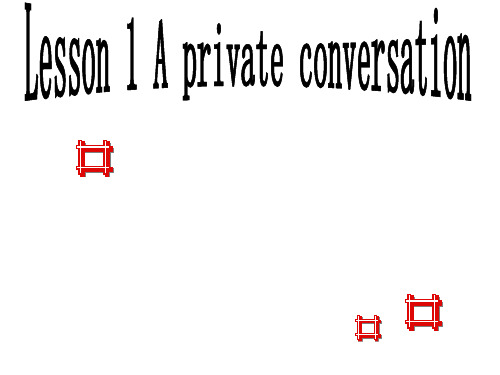
private. • 3.私立的,私营的 • private school/company • privacy n. 隐私 • Everyone has his own privacy.
public
• 1.公众的; • public affairs 公众事务 • public school 公立学校 • 2.公开的: • a public scandal 公开的丑闻 • 3.国家的;政府的 • the public debt 公债
•
15、一年之计,莫如树谷;十年之计 ,莫如 树木; 终身之 计,莫 如树人 。2021年8月2021/8/112021/8/112021/8/118/11/2021
•
16、提出一个问题往往比解决一个更 重要。 因为解 决问题 也许仅 是一个 数学上 或实验 上的技 能而已 ,而提 出新的 问题, 却需要 有创造 性的想 像力, 而且标 志着科 学的真 正进步 。2021/8/112021/8/11August 11, 2021
• ★attention n.注意 pay attention pay attention to… 对…注意 pay a little/much/more attention 稍加/多加/更加注意 pay no attention
• ★bear (bore, borne)v.容忍 =同义词stand, I can’t bear/stand you. endure 忍受,容忍
• 5、You have to believe in yourself. That's the secret of success. ----Charles Chaplin人必须相信自己,这是成功的秘诀。-Thursday, June 17, 2021June 21Thursday, June 17, 20216/17/2021
public
• 1.公众的; • public affairs 公众事务 • public school 公立学校 • 2.公开的: • a public scandal 公开的丑闻 • 3.国家的;政府的 • the public debt 公债
•
15、一年之计,莫如树谷;十年之计 ,莫如 树木; 终身之 计,莫 如树人 。2021年8月2021/8/112021/8/112021/8/118/11/2021
•
16、提出一个问题往往比解决一个更 重要。 因为解 决问题 也许仅 是一个 数学上 或实验 上的技 能而已 ,而提 出新的 问题, 却需要 有创造 性的想 像力, 而且标 志着科 学的真 正进步 。2021/8/112021/8/11August 11, 2021
• ★attention n.注意 pay attention pay attention to… 对…注意 pay a little/much/more attention 稍加/多加/更加注意 pay no attention
• ★bear (bore, borne)v.容忍 =同义词stand, I can’t bear/stand you. endure 忍受,容忍
• 5、You have to believe in yourself. That's the secret of success. ----Charles Chaplin人必须相信自己,这是成功的秘诀。-Thursday, June 17, 2021June 21Thursday, June 17, 20216/17/2021
新概念英语二册L1 ppt
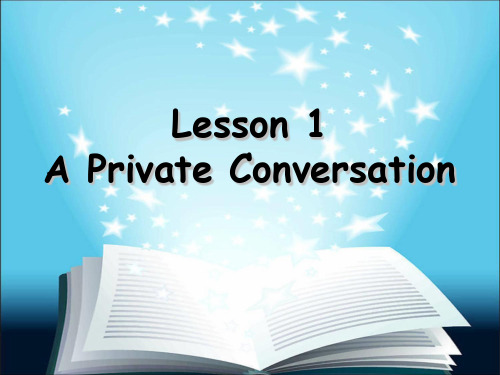
• • • • • • • • private adj. 私人的 反:public It’s my private letter./room. in private 私下的 反:in public 公开的 We can talk about this question in private. privacy n. 隐私 Everyone needs some privacy.
Lesson 1 A Private Conversation
Questions for discussion
• What’s your favorite movie? • Why do you like it? • Do you often go to the cinema?
Key words
Summary Writing
• • • • • • • • 1、Where did the writer go last week? 2、Did he enjoy the play or not? 3、Who was sitting behind him? 4、Were they talking loudly ,or they talking quietly ? 5、Could the writer hear the actors or not? 6、Did he turn around or not? 7、What did he say? 8、Did the young man say ,―the play is not interesting‖ or did he say ,―this is a private conversation‖?
attention n. 注意
pay attention to sb/sth 注意… You must pay attention to your handwriting. • pay a little attention 稍加注意 • pay much attention 多加注意 • pay more attention 更多注意 • pay no attention 不用注意
Lesson 1 A Private Conversation
Questions for discussion
• What’s your favorite movie? • Why do you like it? • Do you often go to the cinema?
Key words
Summary Writing
• • • • • • • • 1、Where did the writer go last week? 2、Did he enjoy the play or not? 3、Who was sitting behind him? 4、Were they talking loudly ,or they talking quietly ? 5、Could the writer hear the actors or not? 6、Did he turn around or not? 7、What did he say? 8、Did the young man say ,―the play is not interesting‖ or did he say ,―this is a private conversation‖?
attention n. 注意
pay attention to sb/sth 注意… You must pay attention to your handwriting. • pay a little attention 稍加注意 • pay much attention 多加注意 • pay more attention 更多注意 • pay no attention 不用注意
新概念英语第二册 Lesson1 课件
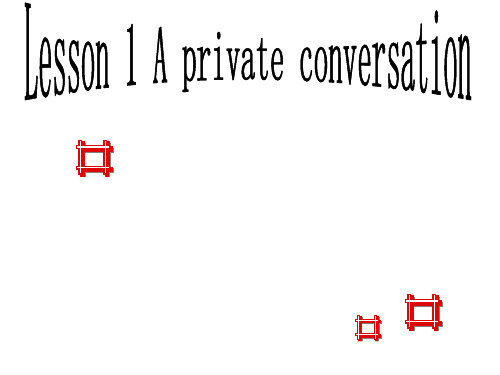
• ★conversation n.谈话(非正式的) They are having a conversation about their holiday.
谈论某事 They are having a conversation with their father.
和某人谈话 talk: 可正式也可为非正式的私聊 dialogue:对话,公谈(正式) China and Korea are having a dialogue.
• ★bear(bore,borne) v. 容忍 • stand v. 容忍
在否定句或疑问句中常与can/could连用 eg: I can't bear/stand you! 我姐姐忍受不了房间里有老鼠! My sister can't bear/stand mouse in the house!
★attention n. 注意 Attention, please. 请注意 Attention! 立正!
• pay attention to : 对什么注意 • You must pay attention to the book. • pay more attention :稍加注意
• ★bear n. 熊 polar bear 北极熊
• It's none of your business. =None of your business =It's my business.
Text
• go to the +地点 表示去某地干什么事 • go to the theatre
= go to the theatre to see a play去剧场看 戏 • go to the cinema =see a film 去电影院看电影
- 1、下载文档前请自行甄别文档内容的完整性,平台不提供额外的编辑、内容补充、找答案等附加服务。
- 2、"仅部分预览"的文档,不可在线预览部分如存在完整性等问题,可反馈申请退款(可完整预览的文档不适用该条件!)。
- 3、如文档侵犯您的权益,请联系客服反馈,我们会尽快为您处理(人工客服工作时间:9:00-18:30)。
辨析:bear/stand /put up with/tolerate bear/stand忍受,遭受,前者语气较轻,二者常混用 (在否定句或疑问句中常于can/could连用) I can't bear/stand the factory's noise. put up with 忍受,容忍(常用于口语中) I'll have to put up with the noise till I move next
口语表达“请坐” sit down, please.(命令性) Take your seat, please. Be seated, please.(更礼貌)
5. play n.戏(通俗的说法) v.玩 play… with 和…玩 player 运动员,比赛者 playboy花花公子 play cards 打牌 play a role/part of 扮演...角色,发挥...作用 TV play 电视剧 opera 歌剧 theatre 戏剧 drama 指带有戏剧性故事情节的戏剧
I'm a private citizen.
2.conversation n.(非正式)谈话 have a conversation with sb. 与某人谈话 Yesterday my teacher had a converstion
with me. make conversation 寒暄,说应酬话 He had been trying to make a conversation. in conversation with sb.正与某人谈话 When I arrived Ifound her in converstion
the library yesterday morning. = Yesterday morning, I read
books carefully in the library.
五大基本句型
1. 主 + 谓(不及物动词)
They
laughed.
The bell rang.
2. 主 + 谓(及物动词)+ 宾
week. tolerate 指不提出反对意见的容忍 He can't tolerate his sister's bad habits, but he
said nothing.
9. business n.事情,生意,公司 例:不关你的事。
It’s none of your business. have no business to do sth. 没权利做某事 do business 做生意 on business 出差 Business is business.公事公办。
left
the door
open.
+ 系动词 + 表语
She
is
clever.
The leaves turns 常见的系动词有:
green.
be, get, appear, become, feel, look, prove, sound, seem, smell, taste 等
‘It’s none of your business,’the young man said rudely.’ This is a private conversation!’
句型分析:
6. I looked at the man and the woman angrily.
析:look 为不及物动词,+宾语 要加at. angrily—副词修饰动词
10. rudely adv. 无礼地,粗鲁地 rude adj. 无礼貌的,粗鲁的 rudeness n. 无礼,粗鲁 Speak rudely. 出言不逊 Don't treat me so rudely.
Last week I went to the theatre.I had a very good seat.The play was very interesting.I did not enjoy it.A young man and a young woman were sitting behind me.They were talking loudly.I got very angry.I could not hear the actors.I turned round.
Because they were talking loudly and he can’t hear a word.
New words and expressions:
1.private adj.私人的 n.私下,不公开, 大兵 private school 私立学校 public school 公办学校
6
1
2
3
when?
Last week
who? which? what?
I
I
Action went had
Who? Which? What?
a very good seat.
The play
was
very interesting.
I
did not enjoy
it.
A young man and a yound were sitting
7. attention n.注意 pay attention to sb./sth. 对...注意
We need to pay attention to other's feelings when we criticize them.
draw/catch one’s attention 吸引某人注意 attract the attention of 吸引...注意 Some boys wear stupid clothes to attract the
Tom
lost
the umbrella.
She
loves
her country.
3. 主 + 谓 + 间接宾语 + 直接宾语
He
gave
me
a book.
John
tells
us
a story
4. 主 + 谓(及物动词)+宾 说明宾语的状态,内容等)
+宾补(补充
Jane made
me
angry.
He 5. 主
Harvard University is a private school. in private 私下
In private, those famous actors still have privacy that we don't know. privacy n.隐私 private citizen 普通公民
Listen to the tape and answer the questions:
1.Where did the writer go to last week? He went to the theatre.
2.Why did the writer complain to the people behind him?
替代词
cross He was cross. annoyed 恼火的 be blue in the face 脸上突然变色
程 I was annoyed. 度 I was angry/cross. 加 I was very angry. 深 I am blue in the face.
(脸色都青了,相当生气)
3.theatre n. 剧院 去看戏 go to the theatre cinema 电影院 去看电影 go to the cinema an open-air theatre 露天剧场 home theatre 家庭影院 我们应该去剧院看一场经典的戏剧。
we should go to the theatre and enjoy a classic play.
woman
They
were talking
4
5
6
How? Where? When?
to the theatre.
behind me. loudly.
简单陈述句的语序
主语+谓语动词+宾语+方式状语+ 地点状语+时间状语
PS:时间状语可以置于开头 例:I read books carefully in
with Mr Bean. converse v.谈话 adj. 相反的
辨析:
conversation 指两人或两人以上交谈,一般用于 正式文体中,
talk内容可正式可不正式(可以朋友之间,两国之 间)
chat 指熟人间的随便交谈,也就是所谓的“侃大 山”,闲聊。
dialogue 即“对话”,多指剧中的对白 gossip 绯闻,嚼舌头,说长道短 gossip girl
1 ---主语,一般由名词、代词或名词短语构成, 通常位于动词之前,动词必须与主语一致,即主语 决定动词的单复数形式
2 ---谓语,由动词充当 3 ---宾语,一般为名词、代词或名词短语 4 ---副词或介词短语,对方式或状态提问,往往做状 语 I like her very much 5 ---地点状语,一般在方式副词之后,时间副词 之前 6 ---时间状语,可以放在句首或句末
be angry with sb 表生气的状态
get angry with sb 表生气的过程
I looked at the man and the woman angrily. They did not pay any attention.In the end,I could not bear it.I turned round again.’I can’t hear a word!’I said angrily.
口语表达“请坐” sit down, please.(命令性) Take your seat, please. Be seated, please.(更礼貌)
5. play n.戏(通俗的说法) v.玩 play… with 和…玩 player 运动员,比赛者 playboy花花公子 play cards 打牌 play a role/part of 扮演...角色,发挥...作用 TV play 电视剧 opera 歌剧 theatre 戏剧 drama 指带有戏剧性故事情节的戏剧
I'm a private citizen.
2.conversation n.(非正式)谈话 have a conversation with sb. 与某人谈话 Yesterday my teacher had a converstion
with me. make conversation 寒暄,说应酬话 He had been trying to make a conversation. in conversation with sb.正与某人谈话 When I arrived Ifound her in converstion
the library yesterday morning. = Yesterday morning, I read
books carefully in the library.
五大基本句型
1. 主 + 谓(不及物动词)
They
laughed.
The bell rang.
2. 主 + 谓(及物动词)+ 宾
week. tolerate 指不提出反对意见的容忍 He can't tolerate his sister's bad habits, but he
said nothing.
9. business n.事情,生意,公司 例:不关你的事。
It’s none of your business. have no business to do sth. 没权利做某事 do business 做生意 on business 出差 Business is business.公事公办。
left
the door
open.
+ 系动词 + 表语
She
is
clever.
The leaves turns 常见的系动词有:
green.
be, get, appear, become, feel, look, prove, sound, seem, smell, taste 等
‘It’s none of your business,’the young man said rudely.’ This is a private conversation!’
句型分析:
6. I looked at the man and the woman angrily.
析:look 为不及物动词,+宾语 要加at. angrily—副词修饰动词
10. rudely adv. 无礼地,粗鲁地 rude adj. 无礼貌的,粗鲁的 rudeness n. 无礼,粗鲁 Speak rudely. 出言不逊 Don't treat me so rudely.
Last week I went to the theatre.I had a very good seat.The play was very interesting.I did not enjoy it.A young man and a young woman were sitting behind me.They were talking loudly.I got very angry.I could not hear the actors.I turned round.
Because they were talking loudly and he can’t hear a word.
New words and expressions:
1.private adj.私人的 n.私下,不公开, 大兵 private school 私立学校 public school 公办学校
6
1
2
3
when?
Last week
who? which? what?
I
I
Action went had
Who? Which? What?
a very good seat.
The play
was
very interesting.
I
did not enjoy
it.
A young man and a yound were sitting
7. attention n.注意 pay attention to sb./sth. 对...注意
We need to pay attention to other's feelings when we criticize them.
draw/catch one’s attention 吸引某人注意 attract the attention of 吸引...注意 Some boys wear stupid clothes to attract the
Tom
lost
the umbrella.
She
loves
her country.
3. 主 + 谓 + 间接宾语 + 直接宾语
He
gave
me
a book.
John
tells
us
a story
4. 主 + 谓(及物动词)+宾 说明宾语的状态,内容等)
+宾补(补充
Jane made
me
angry.
He 5. 主
Harvard University is a private school. in private 私下
In private, those famous actors still have privacy that we don't know. privacy n.隐私 private citizen 普通公民
Listen to the tape and answer the questions:
1.Where did the writer go to last week? He went to the theatre.
2.Why did the writer complain to the people behind him?
替代词
cross He was cross. annoyed 恼火的 be blue in the face 脸上突然变色
程 I was annoyed. 度 I was angry/cross. 加 I was very angry. 深 I am blue in the face.
(脸色都青了,相当生气)
3.theatre n. 剧院 去看戏 go to the theatre cinema 电影院 去看电影 go to the cinema an open-air theatre 露天剧场 home theatre 家庭影院 我们应该去剧院看一场经典的戏剧。
we should go to the theatre and enjoy a classic play.
woman
They
were talking
4
5
6
How? Where? When?
to the theatre.
behind me. loudly.
简单陈述句的语序
主语+谓语动词+宾语+方式状语+ 地点状语+时间状语
PS:时间状语可以置于开头 例:I read books carefully in
with Mr Bean. converse v.谈话 adj. 相反的
辨析:
conversation 指两人或两人以上交谈,一般用于 正式文体中,
talk内容可正式可不正式(可以朋友之间,两国之 间)
chat 指熟人间的随便交谈,也就是所谓的“侃大 山”,闲聊。
dialogue 即“对话”,多指剧中的对白 gossip 绯闻,嚼舌头,说长道短 gossip girl
1 ---主语,一般由名词、代词或名词短语构成, 通常位于动词之前,动词必须与主语一致,即主语 决定动词的单复数形式
2 ---谓语,由动词充当 3 ---宾语,一般为名词、代词或名词短语 4 ---副词或介词短语,对方式或状态提问,往往做状 语 I like her very much 5 ---地点状语,一般在方式副词之后,时间副词 之前 6 ---时间状语,可以放在句首或句末
be angry with sb 表生气的状态
get angry with sb 表生气的过程
I looked at the man and the woman angrily. They did not pay any attention.In the end,I could not bear it.I turned round again.’I can’t hear a word!’I said angrily.
